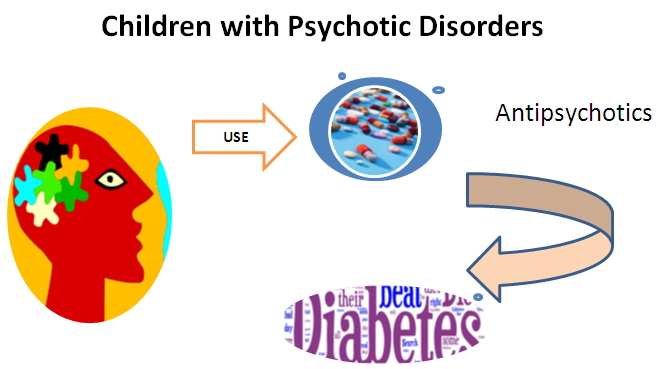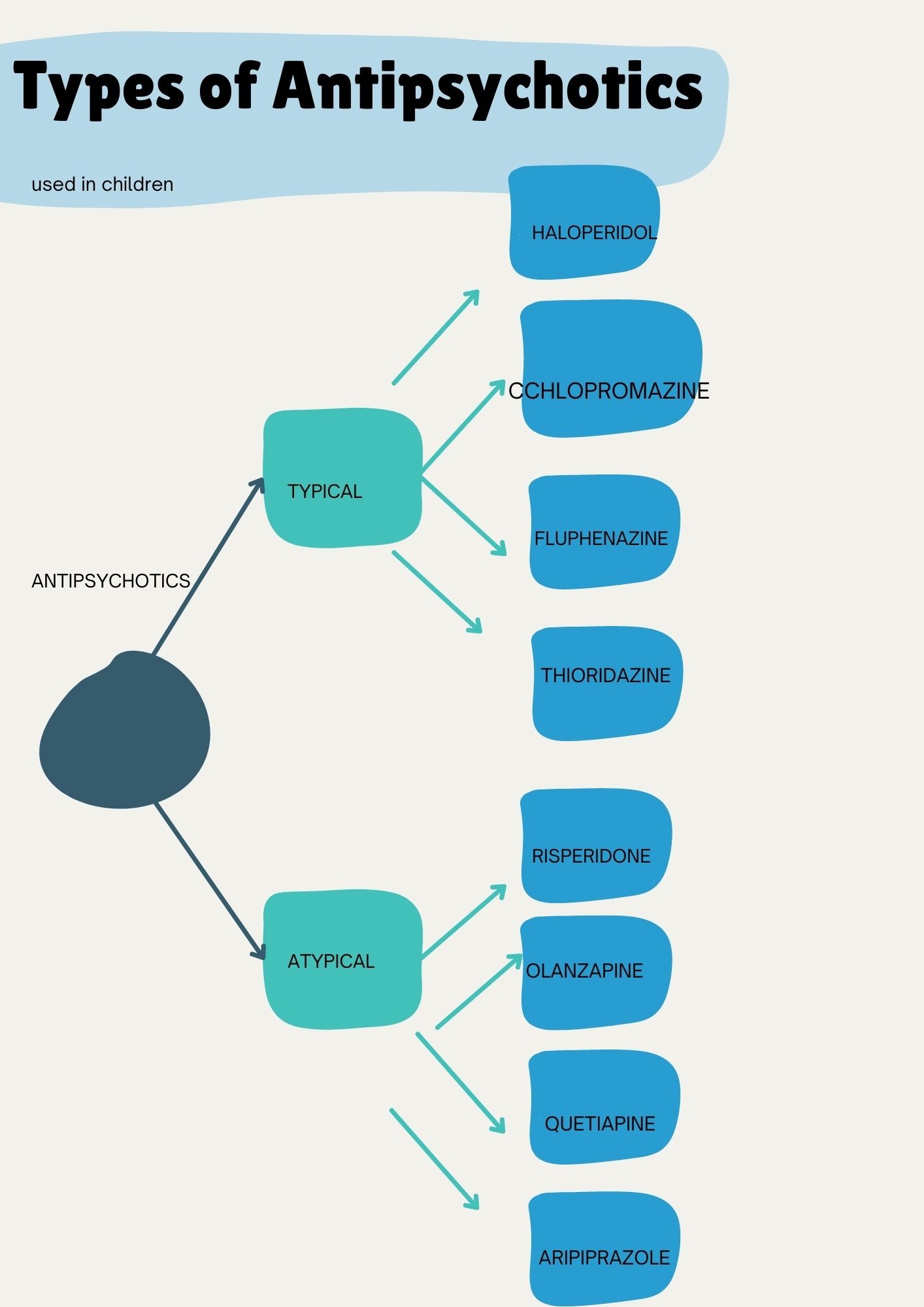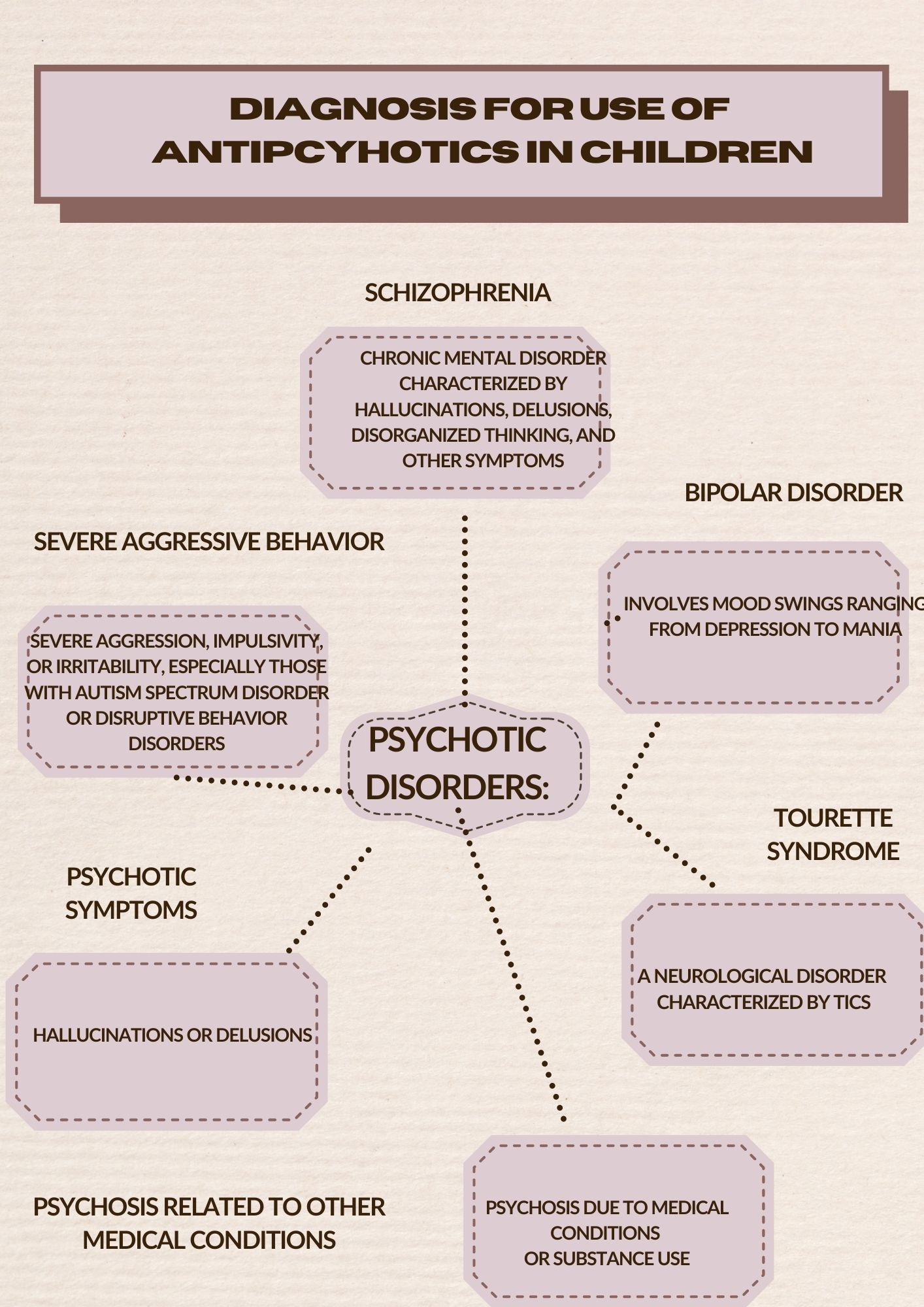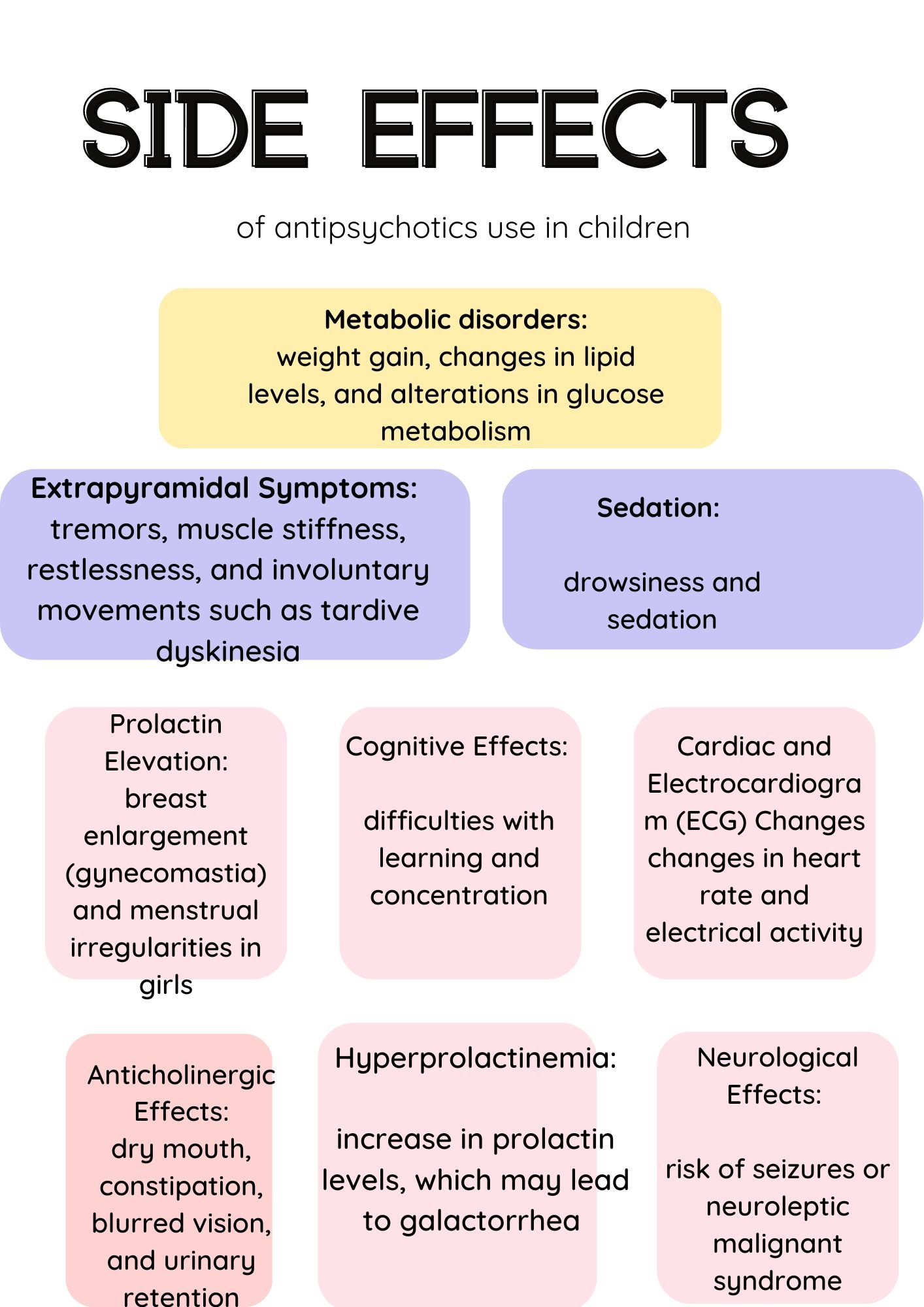Diabetes as Side Effect of Antipsychotic Drugs in Children
Greetings, beloved readers,
The mere mention of children warms the hearts of us all. The journey of nurturing them may be challenging, but witnessing their angelic faces as they play fills our hearts with wonder. We harbor no ill wishes for them, yet alas, diseases strike without regard for our desires.
Facing the illness of a child, particularly one affecting their mental well-being, presents immense challenges. The difficult decision of administering medications, specifically antipsychotics, to our beloved little ones becomes necessary, especially in cases of schizophrenia.
Over time, the application of atypical antipsychotics has expanded to encompass other psychotic disorders such as behavioral and conduct symptoms, as well as affective and bipolar disorders.
However, like any medication, antipsychotics come with their share of side effects.
Consequently, researchers have delved into understanding the impact of antipsychotic drugs on children's metabolism, focusing on potential effects on blood glucose levels and the subsequent risk of diabetes development.
This diligent examination aims to ensure the overall safety and well-being of the young patients who rely on these medications.
In such challenging circumstances, parents and caregivers are faced with making informed decisions, weighing the potential benefits of these medications against the possible side effects, to provide the best possible care and support for their precious ones.
It is through ongoing research and a deep commitment to the welfare of children that we strive to alleviate their suffering and improve their quality of life.
What antipsychotics are used in children?
Antipsychotic medications are sometimes prescribed to children and adolescents to manage certain psychiatric conditions.
However, it's important to note that the use of antipsychotic drugs in children is typically reserved for severe cases when other treatments have not been effective, and the decision to use these medications is made carefully by healthcare professionals.
The types of antipsychotic drugs used in children are generally categorized into two main classes: typical antipsychotics and atypical antipsychotics.
Here's a brief overview of each:
- Typical Antipsychotics (First-generation antipsychotics): Examples: Haloperidol, Chlorpromazine, Fluphenazine, Thioridazine, etc. These were the first antipsychotic drugs developed and have been used for several decades. They primarily block dopamine receptors in the brain, which helps reduce psychotic symptoms but may also cause more side effects compared to atypical antipsychotics.
- Atypical Antipsychotics (Second-generation antipsychotics): Examples: Risperidone, Olanzapine, Quetiapine, Aripiprazole, Ziprasidone, Paliperidone, etc. These are newer antipsychotic medications and are often preferred for children due to a potentially lower risk of certain side effects. Atypical antipsychotics also act on serotonin receptors, which may provide additional benefits for certain conditions. They are commonly prescribed for conditions like schizophrenia, bipolar disorder, and certain behavioral disorders in children.
The use of antipsychotic drugs in children requires close monitoring by a qualified healthcare professional due to potential side effects and individual variability in response.
Side effects can include weight gain, metabolic changes, movement disorders, and other adverse reactions. The benefits and risks must be carefully weighed before starting any antipsychotic treatment in children.
When Antipsychotic Drugs are used in Children?
Antipsychotic drugs may be used in children when they are diagnosed with certain psychiatric conditions that do not respond well to other treatments or when their symptoms are severe and significantly impair their daily functioning.
The decision to use antipsychotic medications in children is typically made by a qualified healthcare professional (such as a child psychiatrist) after a thorough evaluation of the child's symptoms, medical history, and overall health.
Some of the psychiatric conditions for which antipsychotic medications might be considered in children include:
- Schizophrenia: Antipsychotic drugs are often prescribed to children and adolescents with schizophrenia, a chronic mental disorder characterized by hallucinations, delusions, disorganized thinking, and other symptoms.
- Bipolar Disorder: Children with bipolar disorder, which involves mood swings ranging from depression to mania, might benefit from antipsychotic medications to help stabilize their mood.
- Severe Aggressive Behavior: In some cases, children with severe aggression, impulsivity, or irritability, especially those with autism spectrum disorder or disruptive behavior disorders, may be prescribed antipsychotics to manage these challenging behaviors.
- Tourette Syndrome: Antipsychotic drugs might be used in children with Tourette syndrome, a neurological disorder characterized by tics, as they can help reduce tics and associated symptoms.
- Psychotic Symptoms: Children experiencing psychotic symptoms, such as hallucinations or delusions, may be considered for antipsychotic treatment to alleviate these distressing experiences.
- Psychosis related to other medical conditions: In some instances, children may develop psychosis due to medical conditions or substance use, and antipsychotic medications may be used to address these symptoms.
It is crucial to note that the use of antipsychotic drugs in children is approached cautiously, and healthcare professionals carefully weigh the potential benefits against the risks and side effects.
Non-pharmacological interventions, such as psychotherapy, behavioral therapy, and family support, are usually attempted before resorting to antipsychotic medications.
When medication is necessary, the lowest effective dose is typically prescribed, and the child's progress is closely monitored to ensure safety and effectiveness.
Which Age-Group of Children can take Antipsychotics?
The use of antipsychotic medications in children is generally considered in older children and adolescents, typically ranging from around 6 to 18 years old.
However, the specific age range may vary based on the country, healthcare guidelines, and individual circumstances.
Antipsychotic drugs are not commonly prescribed to younger children due to several factors, including:
- Limited Research: There is relatively limited research on the safety and efficacy of antipsychotic medications in very young children (e.g., under the age of 6). As a result, healthcare professionals may be cautious about prescribing these drugs to such young children.
- Developmental Considerations: Younger children's brains and bodies are still developing, and the effects of antipsychotic drugs on their growth and development need careful evaluation.
- Risks and Side Effects: Antipsychotic medications can have significant side effects, including metabolic changes, weight gain, movement disorders, and potential long-term effects on physical and mental health. These risks must be weighed carefully in relation to the child's condition and developmental stage.
- Alternative Treatments: Younger children often respond well to non-pharmacological treatments, such as behavioral therapy, psychotherapy, and family support. These approaches are usually considered first before considering medication.
In certain exceptional cases, a child psychiatrist or pediatrician may consider prescribing antipsychotic medications to very young children if the benefits outweigh the risks and other treatments have been ineffective.
However, this decision is made on an individual basis and involves close monitoring and ongoing assessment.
For children under the age of 6 who may be experiencing behavioral or emotional difficulties, early intervention services and behavioral therapies are typically the first-line approach.
Side effects of Antipsychotics on Children
The use of antipsychotic drugs in children can be associated with various side effects.
It's important to note that the specific side effects and their severity can vary depending on the type of antipsychotic medication used, the individual child's response to the drug, the dosage, and the duration of treatment.
Here are some general aspects of side effects related to antipsychotic drug use in children:
- Metabolic Side Effects: Some antipsychotic medications, particularly atypical antipsychotics, can cause weight gain, changes in lipid levels, and alterations in glucose metabolism. These metabolic side effects can increase the risk of obesity, type 2 diabetes, and cardiovascular issues.
- Extrapyramidal Symptoms (EPS): EPS are movement-related side effects that can occur with antipsychotic use. These may include tremors, muscle stiffness, restlessness, and involuntary movements such as tardive dyskinesia.
- Sedation: Antipsychotic drugs can cause drowsiness and sedation, which may impact a child's energy levels, alertness, and ability to focus.
- Prolactin Elevation: Some antipsychotics can increase the levels of the hormone prolactin in the blood, leading to potential side effects such as breast enlargement (gynecomastia) and menstrual irregularities in girls.
- Cognitive Effects: Antipsychotics may affect cognitive functioning and memory in some children, leading to difficulties with learning and concentration.
- Cardiac and Electrocardiogram (ECG) Changes: Certain antipsychotic medications can cause changes in heart rate and electrical activity, which may require monitoring, especially in children with pre-existing cardiac conditions.
- Anticholinergic Effects: Antipsychotic drugs may have anticholinergic properties, leading to side effects like dry mouth, constipation, blurred vision, and urinary retention.
- Hyperprolactinemia: Some antipsychotics can cause an increase in prolactin levels, which may lead to galactorrhea (spontaneous milk secretion from the breasts) in both boys and girls.
- Neurological Effects: In rare cases, antipsychotics may be associated with a risk of seizures or neuroleptic malignant syndrome (NMS), a severe and potentially life-threatening condition characterized by muscle rigidity, fever, and altered mental status.
It's crucial for healthcare professionals to monitor children closely when they are prescribed antipsychotic medications and to consider the benefits and risks of treatment for each individual case.
Some side effects can be managed with dosage adjustments or additional medications, while others may require discontinuation or switching to a different antipsychotic.
Families and caregivers should be educated about potential side effects and the importance of regular follow-up and communication with healthcare providers during the course of treatment.
Use of Antipsychotics in Children and Metabolic Disorders
Antipsychotic drugs, particularly some of the atypical antipsychotics, have been associated with an increased risk of metabolic disorders in both children and adults.
Metabolic disorders refer to a cluster of conditions that affect the body's metabolism, including changes in weight, blood sugar levels, and lipid profiles. The main metabolic side effects of antipsychotic medications in children are:
- Weight Gain: One of the most common metabolic side effects of antipsychotics is weight gain. Children treated with certain antipsychotic drugs may experience significant weight gain, which can lead to obesity. Excessive weight gain is a concern because it increases the risk of other health issues such as diabetes, cardiovascular problems, and metabolic syndrome.
- Dyslipidemia: Antipsychotic medications can also alter lipid (fat) levels in the blood, leading to dyslipidemia. Dyslipidemia involves abnormal levels of cholesterol and triglycerides, which are risk factors for heart disease.
- Insulin Resistance and Diabetes: Some antipsychotic drugs have been linked to insulin resistance, a condition in which the body's cells do not respond adequately to insulin, leading to higher blood sugar levels. Insulin resistance can increase the risk of developing type 2 diabetes.
The risk and severity of metabolic side effects can vary depending on the specific antipsychotic drug, the dose used, the duration of treatment, and individual factors such as genetics and lifestyle.
Certain antipsychotics, such as olanzapine and clozapine, tend to be associated with a higher risk of metabolic side effects compared to others.
It is essential for healthcare providers to carefully monitor children and adolescents prescribed antipsychotic medications for any signs of metabolic side effects.
Regular monitoring of weight, blood pressure, blood sugar levels, and lipid profiles is typically recommended. If metabolic abnormalities are detected, appropriate interventions, such as lifestyle changes and medication adjustments, may be implemented to mitigate the risk.
It's important to note that despite the potential metabolic side effects, antipsychotic medications can be essential for managing certain psychiatric conditions in children.
The decision to use these medications should be made on an individual basis, considering the child's specific needs, the severity of their condition, and a careful assessment of the potential benefits and risks.
Family involvement and collaboration with healthcare professionals are crucial in ensuring the best possible outcomes for children receiving antipsychotic treatment.
Antipsychotics in children and insulin resistance

Antipsychotic medications, especially some atypical antipsychotics, have been associated with an increased risk of insulin resistance in children.
Insulin resistance is a condition where the body's cells do not respond properly to insulin, leading to higher blood sugar levels.
Over time, insulin resistance can contribute to the development of type 2 diabetes and other metabolic disturbances.
Here are some key points about antipsychotics and insulin resistance in children:
- Mechanism: The exact mechanisms through which antipsychotic medications lead to insulin resistance are not fully understood. However, it is believed that these medications can affect various metabolic pathways, including altered glucose metabolism and changes in lipid (fat) levels in the blood.
- Atypical Antipsychotics: Some atypical antipsychotic medications, such as olanzapine and clozapine, have been particularly linked to an increased risk of insulin resistance and other metabolic side effects in children.
- Weight Gain: Antipsychotic drugs are known to cause weight gain, and excessive weight gain is a significant risk factor for insulin resistance. Many atypical antipsychotics are associated with more substantial weight gain compared to typical antipsychotics.
- Prolactin Elevation: Some antipsychotics can increase the hormone prolactin, which might contribute to metabolic disturbances and insulin resistance.
- Early-Onset Diabetes: In some cases, children treated with antipsychotics may develop early-onset diabetes, which necessitates careful monitoring and management.
- Individual Variability: Not all children who take antipsychotic medications will develop insulin resistance or diabetes. The risk varies based on the specific medication, dose, duration of treatment, individual factors, and lifestyle.
- Monitoring and Management: Healthcare professionals who prescribe antipsychotics to children should carefully monitor their metabolic health, including regular assessments of weight, blood pressure, blood glucose levels, and lipid profiles. If insulin resistance or other metabolic abnormalities are detected, interventions such as lifestyle changes and medication adjustments may be considered.
It's crucial for healthcare providers to weigh the benefits of antipsychotic treatment against the potential risks of metabolic side effects in children.
For children prescribed antipsychotic medications, it is essential to implement a holistic approach to care, including regular medical check-ups, dietary counseling, and physical activity recommendations, to minimize the risk of insulin resistance and other metabolic complications.
As with any medical condition, communication between healthcare providers, children, and their caregivers is essential for optimizing treatment outcomes and managing potential side effects effectively.
In the end, as a responsible parent, it is essential to engage in open and informed discussions with the treating doctor, seeking to understand all available options and their associated risks.
While antipsychotic medications may be beneficial in addressing certain mental health conditions in children, it is vital to proceed with caution and vigilance, safeguarding the overall well-being of the young patients.
|
Written by Dr.Albana Greca Sejdini, Md, MMedSc Medically reviewed by Dr.Ruden Cakoni, MD, Endocrinologist |
Last reviewed 07/28/2023 |
References:
References:
- American Academy of Child & Adolescent Psychiatry (AACAP): Website: https://www.aacap.org/ AACAP provides information on psychotropic medications, including antipsychotics, and their use in children and adolescents. You can find guidelines and resources related to side effects and their management.
- National Institute of Mental Health (NIMH): Website: https://www.nimh.nih.gov/ NIMH is a leading government agency conducting research on mental health disorders. You can find information on antipsychotic medications and their potential side effects in children on their website.
- U.S. Food and Drug Administration (FDA): Website: https://www.fda.gov/ The FDA is responsible for regulating medications and providing information on their safety and side effects. You can search for drug-specific information and labels on their website.
- PubMed Central (PMC): Website: https://www.ncbi.nlm.nih.gov/pmc/ PMC is a free archive of biomedical and life sciences journal literature. You can search for specific research articles on the side effects of antipsychotic medications in children.
- World Health Organization (WHO): Website: https://www.who.int/ WHO may have information and guidelines related to the use of antipsychotic medications in children and potential side effects.
Diabetes complications Questions or Problems? Get Help Here
This is the place where you can ask a question about any aspect of diabetes complications.
It's free and it's easy to do. Just fill in the form below, then click on "Submit Your Question".



